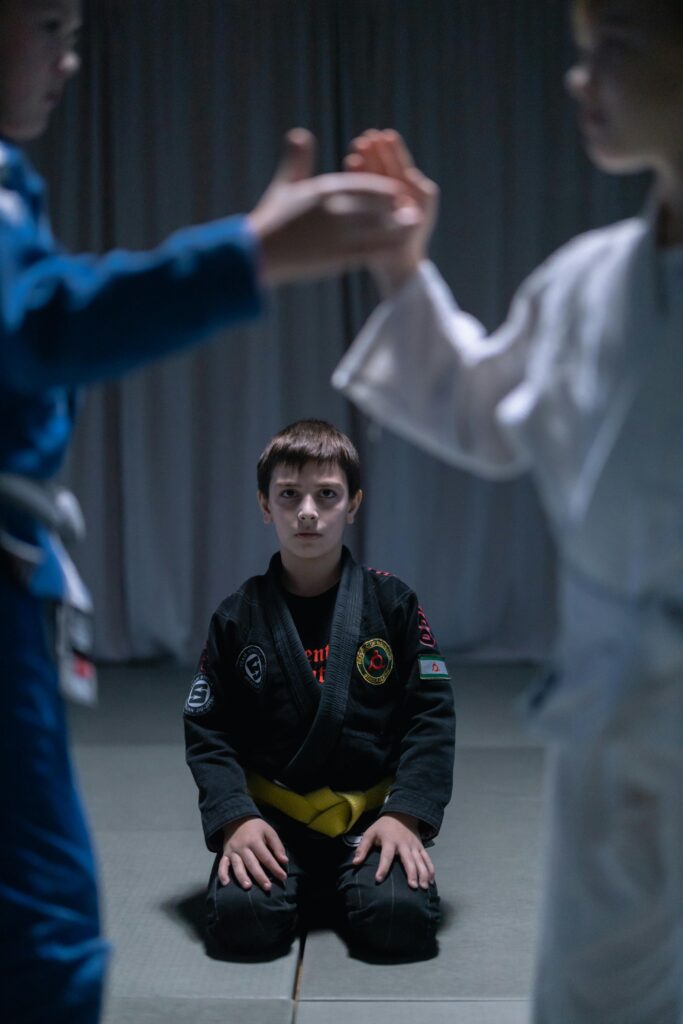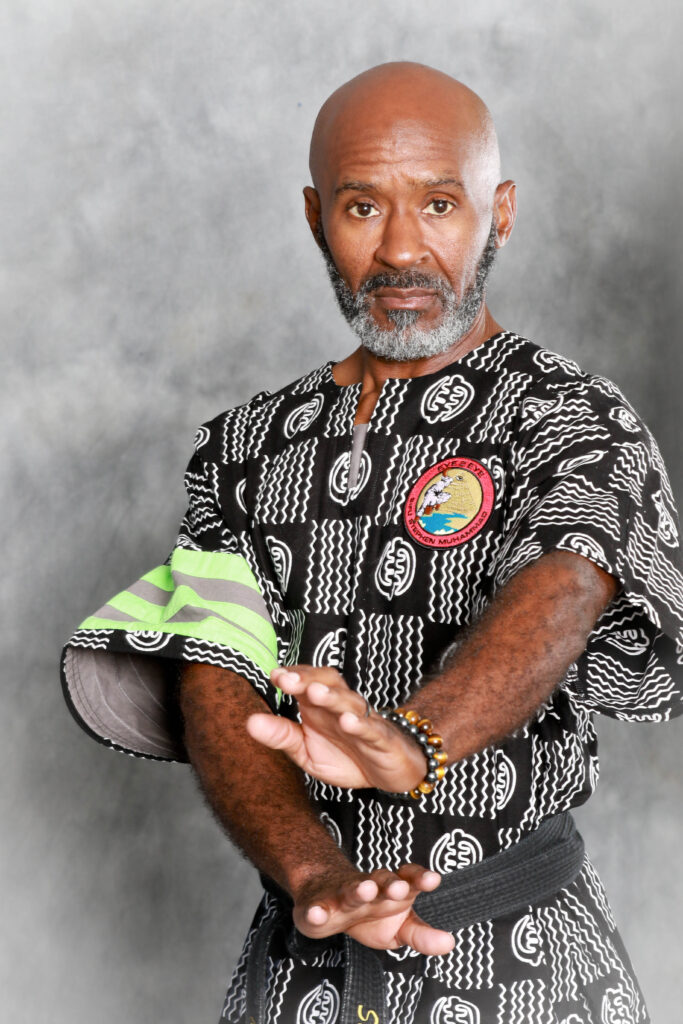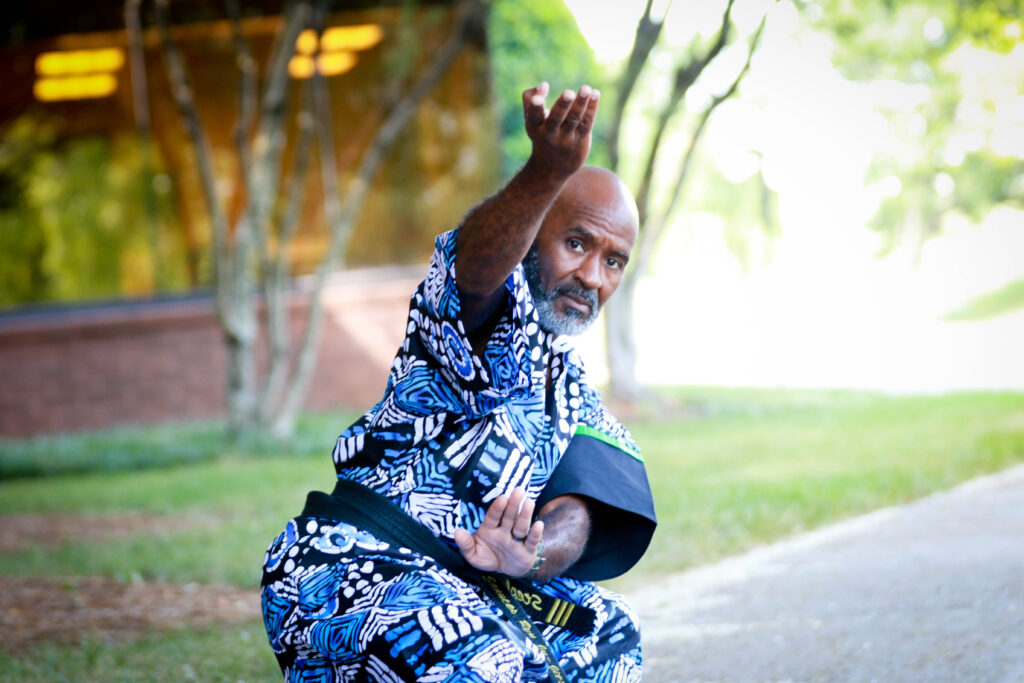Settling on the best form of self-defense for children can be overwhelming—after all, there are so many options out there! From Jiu-Jitsu to Taekwondo to Karate, each martial art promises to teach your child skills that go beyond just physical moves.
But how do you know which one is right for your child? Let me share some insights based on years of experience working with young warriors here at Eye2Eye Combat.
Choosing the right program for your kid isn’t just about learning to fight back; it’s about giving them a sense of confidence, respect, and a community that supports them.
Understanding Different Self-Defense Styles for Kids
Not all martial arts are created equal, especially when it comes to teaching children. Some styles prioritize physicality, while others focus on strategy and technique.
You’ll often hear people talk about Karate, Jiu-Jitsu, and Taekwondo when they think about youth self-defense classes. But what are the real differences?
Jiu-Jitsu
I often recommend Jiu-Jitsu for children. It’s a fantastic option because it focuses on using leverage and technique instead of raw power. This makes it perfect for kids who might not be the biggest or strongest.
In Brazilian Jiu-Jitsu classes, kids learn how to protect themselves on the ground, escape dangerous positions, and even control an opponent without needing to punch or kick.
I’ve seen smaller, more timid kids build incredible confidence through Jiu-Jitsu because it shows them that strength isn’t everything.
Karate
Karate is known for its strikes and structured forms (or katas). This discipline is all about repetition and perfection, which helps kids develop focus and discipline.
It’s a great fit for kids who thrive on structure and enjoy following a clear path to progress.
Plus, Karate emphasizes the value of respect for oneself and others—a quality we hold dear at Eye2Eye Combat.
Taekwondo
Think of Taekwondo as the sport for kids with lots of energy. With its emphasis on high, dynamic kicks and acrobatics, it’s ideal for children who love to move around and stay active.
Taekwondo schools often have rigorous programs that instill discipline and teach students to set and achieve goals through belt ranking systems.
So, what’s the takeaway? While all these styles offer solid foundations, the best choice really depends on your child’s personality and what you hope they’ll gain from the experience.
Factors to Consider When Choosing a Self-Defense Style for Your Child
When helping parents decide, I always ask them to consider their child’s physical and emotional needs first. Do they need help building confidence? Are they already physically active and looking for a challenge? Let’s break down the key factors:
Age and Physical Development
Younger children, around 5-7 years old, may benefit more from a style that emphasizes coordination and control rather than strength, such as Aikido or beginner-level Jiu-Jitsu.
As they grow older and stronger, they might find Taekwondo’s dynamic movements more enjoyable or appreciate Karate’s structured approach.
Personality and Interests
I’ve had kids walk through our doors who were shy and timid, unsure if martial arts was even for them. For these children, I often recommend starting with Jiu-Jitsu. It’s a style that doesn’t require aggression but teaches kids how to calmly handle confrontations.
On the other hand, if a child is outgoing and loves active sports, Taekwondo’s high-energy environment might be a better fit.
Ultimately, the best self-defense style for your child is one that aligns with their needs and encourages them to stick with it.
Benefits of Self-Defense Training for Children
So, why should you even consider enrolling your child in a self-defense class? Beyond the ability to defend themselves, these classes offer life-changing benefits.
Building Confidence and Respect
Confidence isn’t something we can just hand to our kids—it has to be earned. Watching a child go from unsure and hesitant to confident and assertive is one of the most rewarding parts of what we do.
They learn to respect themselves and others, not just through martial arts techniques but through understanding the discipline and dedication it takes to master those skills.
Developing Problem-Solving Skills
Martial arts teach kids to think on their feet. In Jiu-Jitsu, for example, they have to figure out how to escape a tight hold or avoid being pinned down.
This sort of strategic thinking isn’t just applicable in the dojo—it helps kids handle difficult situations in school or at home.
Encouraging Physical and Mental Well-Being
One thing I’ve noticed about our students, whether they’re enrolled in youth self-defense classes or more advanced Brazilian Jiu-Jitsu programs, is that they’re generally more active and engaged.
Martial arts provide a full-body workout that builds strength, flexibility, and endurance, which is essential for growing kids.
Comparing the Top Self-Defense Options for Kids
There’s no one-size-fits-all when it comes to self-defense. To help you narrow it down, I’ll give you a snapshot of how the top styles stack up.
Jiu-Jitsu: Why It’s a Top Choice
I’m partial to Jiu-Jitsu because it’s highly effective and adaptable. Kids learn how to neutralize a threat without having to strike back, making it a safer option for schoolyard conflicts or interactions with other kids.
It’s a style that emphasizes control over aggression, which I believe is essential for young learners.
Taekwondo: Best for Physical Activity
If your child is already active and loves to move, Taekwondo can be a great fit. The emphasis on kicking and jumping helps develop flexibility and balance.
Plus, its competitive nature can push kids to achieve more, whether it’s mastering a new technique or moving up in belt ranks.
Karate: Building Discipline and Focus
Karate’s structured approach helps kids develop discipline and focus through repetitive forms. It’s an excellent way to teach children how to set and achieve goals, which can translate to better performance in school and other areas of life.
Choosing the Right Program and Instructor
Finding the right program is about more than just choosing a style—it’s about finding an instructor who can connect with your child and create a positive, encouraging environment.
1. Ask About the Instructor’s Experience
A good instructor knows how to teach martial arts, but a great instructor knows how to connect with kids and keep them motivated.
Ask about their experience working with children and how they handle difficult situations like a child who may be struggling to keep up.
2. Visit the Class in Person
Always try to visit the class and observe before committing. Look at how the instructor interacts with the students and whether the kids seem engaged and excited. It’s also a good opportunity to ask other parents about their experiences.
3. Consider the Class Size
Smaller classes mean more individual attention, which is especially important for younger children or beginners. Look for classes with a low student-to-teacher ratio to ensure your child gets the guidance they need.
4. Safety Considerations
Ensure that the class environment is safe and supportive. This includes proper equipment, safety mats, and a focus on non-violent conflict resolution. Make sure the instructors are certified and have first-aid training in case of emergencies.
Practical Tips for Supporting Your Child’s Self-Defense Journey
Starting your child on their martial arts journey is a big step. Here are some tips to help you support them:
- Encourage Practice at Home: Make it a family activity if you can. Help them practice their stances or go through the moves they learned in class.
- Set Goals Together: Whether it’s mastering a new technique or achieving a higher belt rank, help your child set achievable goals and celebrate their progress along the way.
- Stay Involved: Attend classes when possible, ask the instructor for feedback, and show your child that you’re invested in their growth.
Help Your Kid Develop Skills, Confidence, and Strength at Eye2Eye Combat!
Wrapping up, choosing the best form of self-defense for your child can seem daunting, but it’s really about finding a program that nurtures their growth both physically and mentally.
Whether it’s Jiu-Jitsu for control and strategy, Karate for focus and discipline, or Taekwondo for high-energy fun, the right class can be a game-changer.
At Eye2Eye Combat, we’re passionate about helping kids discover their strengths and build confidence that goes far beyond the mats.
If you’re ready to see your child thrive, come explore our dynamic classes that are designed to empower and inspire every child. Let’s give your child the tools they need to succeed—visit us at Eye2Eye Combat and see what makes our programs stand out!
FAQs
Which self-defense is best for kids?
I’ve found that Jiu-Jitsu is one of the best options for kids. It focuses on using technique and leverage instead of strength, making it ideal for children of all sizes. Plus, it teaches them how to stay calm under pressure and safely control situations. That said, the best style really depends on your child’s personality and interests, so it’s worth exploring different classes to find the right fit.
What is the most effective fighting style for self-defense?
For self-defense, I recommend a blend of styles like Jiu-Jitsu, Aikido, and Krav Maga. Each has unique strengths: Jiu-Jitsu teaches grappling and control, Aikido focuses on using an attacker’s energy against them, and Krav Maga emphasizes real-world scenarios. The combination of these techniques offers a well-rounded approach that prepares you for different situations.
What is the best method for self-defense?
The best method for self-defense is one that emphasizes awareness and practicality. It’s less about throwing punches and more about knowing how to avoid conflicts, defuse situations, and protect yourself if needed. Styles like Jiu-Jitsu or Krav Maga work well because they focus on practical techniques that anyone can use effectively, regardless of size or strength.
At what age should a child learn self-defense?
Kids can start learning self-defense as early as 5 or 6 years old, depending on their maturity and interest. At that age, classes focus on basic movements, discipline, and building confidence. As they get older, they can take on more advanced techniques. Starting early helps kids develop the skills and mindset they need to protect themselves and handle tough situations.
Should you teach your kids self-defense?
Absolutely! Teaching kids self-defense isn’t just about physical skills—it’s about building confidence, teaching them to respect others, and helping them stay safe. They learn to handle bullying, understand boundaries, and develop better self-control. Plus, it’s a fun way to stay active and meet new friends, which is always a bonus.
Can I practice self-defense at home?
Yes, you can definitely practice self-defense at home! Start with basic drills like balance and coordination exercises, then work on specific moves you’ve learned in class. Just make sure you have a safe space and, if possible, a partner to practice with. Remember, practicing at home should be about reinforcing techniques and building muscle memory—not about sparring or intense workouts.





